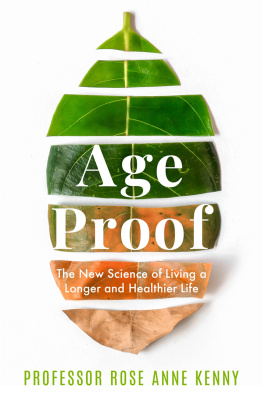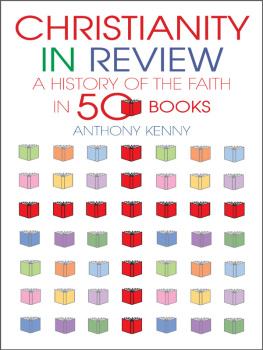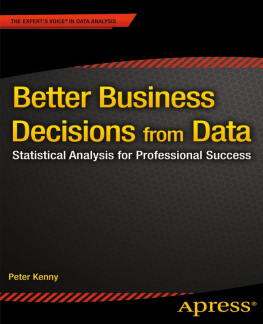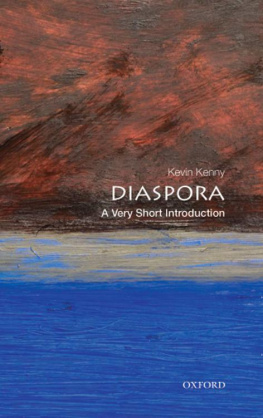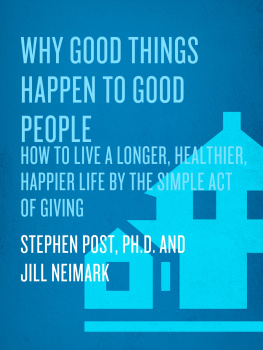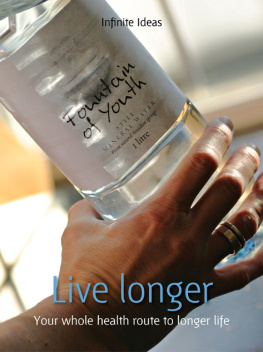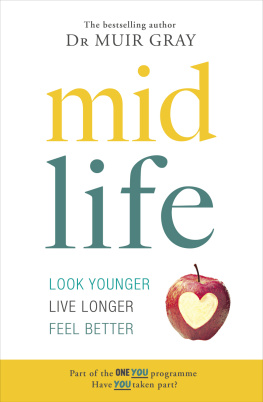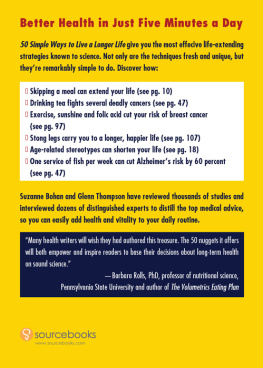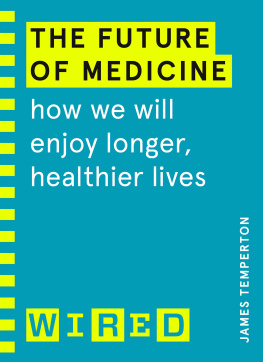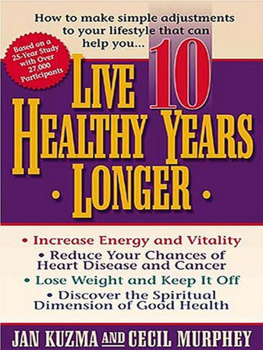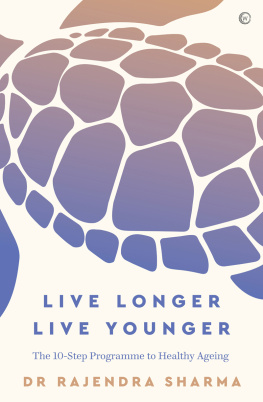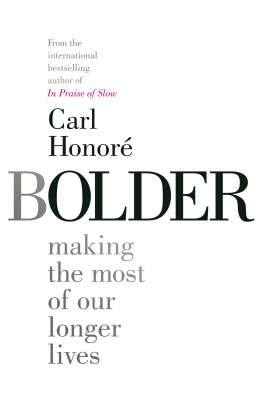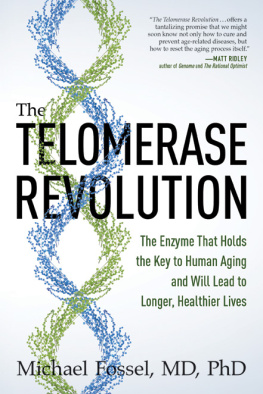
About the Author
Professor Rose Anne Kenny is an award-winning physician and researcher who has been Head of the academic department of Medical Gerontology at Trinity College, Dublin since 2006. She is the founding Principal Investigator of The Irish LongituDinal study on Ageing (TILDA). Prof Kenny has published over 600 scientific publications to date and was admitted as a Member of the Royal Irish Academy (M.R.I.A) in 2014 Irelands highest recognition for scientific excellence. She recently received a Lifetime Achievement Award for her research on ageing at the world congress in Kuala Lumpur 2019. She was voted a Health Hero by the Irish Times in 2018, won the Trinity Innovation Award in 2017 and was elected President of the Irish Geriatrics Society in 2020.

First published in the UK by Lagom
An imprint of Bonnier Books UK
4th Floor, Victoria House, Bloomsbury Square,
London, WC1B 4DA
England
Owned by Bonnier Books
Sveavgen 56, Stockholm, Sweden
Hardback ISBN: 978 1 7887 0504 2
Trade Paperback ISBN: 978 1 7887 0505 9
Ebook ISBN: 978 1 7887 0507 3
All rights reserved. No part of the publication may be reproduced, stored in a retrieval system, transmitted or circulated in any form or by any means, electronic, mechanical, photocopying, recording or otherwise, without prior permission in writing of the publisher.
A CIP catalogue of this book is available from the British Library.
1 3 5 7 9 10 8 6 4 2
Copyright Rose Anne Kenny 2022
Rose Anne Kenny has asserted her moral right to be identified as the author of this work in accordance with the Copyright, Designs and Patents Act 1988.
Every reasonable effort has been made to trace copyright holders of material reproduced in this book, but if any have been inadvertently overlooked the publishers would be glad to hear from them.
Lagom is an imprint of Bonnier Books UK
www.bonnierbooks.co.uk
Dedicated to the memory of my Mum and Dad
Kay and Billy Kenny
Contents
Purpose in Life Subscale of the Ryff
Psychological Well-being Scale
Center for Epidemiological Studies Depression
Short Form Scale
O N A WET, DARK NIGHT IN JANUARY 2018, I PLOUGHED through the pools of water that covered the black road heading for a town in the middle of Ireland. I was to give a lecture on ageing and health to the townsfolk. During the miserable journey, my despondency deepened at the hopelessness of ever attracting an audience on such a bad night. Hosted in a cold hotel which usually catered for funerals and weddings, it was billed as the first lecture of an all-Ireland tour to share new research by a Trinity College academic.
The ballroom was large, cold and empty; the small lectern seemed out of place and lonely, staring down on a mass of empty gold wedding chairs. The overhead projector was too old to be compatible with our PowerPoint system, so my PA headed off into the night to source alternative technology. Mumbling to myself, I must be mad, I encountered the shy hotel manager who completed my gloomy apprehension by apologising on account of a competing event across the street, the Mission. I hadnt heard that term in so long. The Mission is a long-standing Irish tradition, an annual event where the local Catholic church hosts preachers and sermons from visiting religious orders. My heart sank: in rural Ireland, the Mission would be inequitable competition.
Yet little by little, the hall started to fill. People of all ages bustled in: 30-year-old mums with kids, 50-, 60-, 70-year-old men and women. Two buses pulled up outside and disgorged their prattling contents from the surrounding countryside and villages. Next, residents from a care home shuffled in, transported by a kindly local volunteer police officer in full uniform. The space began to warm with mounting chatter, growing laughter and the clinking of china. The local GAA football club was serving tea, coffee and cakes, and on display were Irelands two most prized sporting trophies: the Sam Maguire and Liam McCarthy cups, provoking photos and more banter from the swelling crowd. A local childrens band set up their instruments; the audience took their seats and, to the rhythm of lively jigs and reels, I settled in to begin my first of many such lectures.
Afterwards, I met with the audience, who were brimming with questions and comments. I was taken aback when some remarked that they had never attended a lecture previously, apart from the priests sermon on a Sunday morning (ironic, in light of the Mission across the road they had now missed). This was chastening. Many asked if I had written down the content of the lecture and whether there was a book that covered the information I had shared, thus planting the seed for this publication. The book is a distillation of the content of the lectures and a tribute to the joy I experienced in sharing the knowledge and experience on the road trip of a lifetime.

Time and time again, patients, work colleagues and friends have told me how they hate the thought of growing old. People in their forties and fifties say they try not to think about it because for them it carries such negative overtones. And yet, the science in this field is vast and moving ahead very rapidly. When I was a young doctor, it was almost non-existent but over the past 20 years it has exploded. The field continues to evolve at a pace, providing us with good evidence that the last lap, as one of my patients calls it, can actually be the most relaxed, worthwhile and enjoyable period of our lives particularly if we prepare for it.
Part of that preparation is understanding what factors determine ageing and what we can do about it, in a timely fashion. Have you ever paused to wonder why we are living longer? A baby girl born today will live on average three months longer than her sister born last year. In 1800, you could expect to live to 40; 200 years later, that has more than doubled and we can expect to live to 85 and beyond. When I was starting my medical career, it was an unusual event to have a patient of 100 years or more in the hospital and we would flock to view this rarity this is not uncommon today.
I was first wooed by clinical ageing when I was a young trainee doctor and the fascination for why we age continues to drive my curiosity and research. Then and now, engaging with patients and learning from their life stories guides answers and solutions, raising the obvious questions about why some people appear resilient to ageing while others age early.
The Blue Zones hold many of the secrets that can help answer these questions. They are five places around the world, in Sardinia, Italy; Okinawa, Japan; California, USA; Nicoya, Costa Rica and Ikaria, Greece, all beside the sea, which have the highest proportions of centenarians worldwide. People of the Blue Zones dont just live longer but are fitter and stronger and less likely to get sick in old age. They are more likely to live healthy and physically active lives beyond 100.
In this book, I have built on the knowledge weve gained from studying the Blue Zones to share the up-to-date science underpinning successful ageing. The cornerstone of successful longevity in the Blue Zones comprises several fun things: having a purpose in life, being curious, having lots of variety, laughter, friendship and enjoying a sense of belonging and close, strong connections with friends and family, including shared meals, wine and much more. Since the discovery of the zones and the factors that determine the healthy longevity of those who live there, there has been much research into why these things affect ageing and the biological reasons that underpin why Blue Zone people live so long and so well. How could something like having a purpose each day affect us biologically so that cell ageing slows down? And why have we evolved to need to have a purpose to survive? Knowing this, how can we ensure that we retain purpose in our lives every day? These are some of the questions that will be explored in these pages.
Next page
